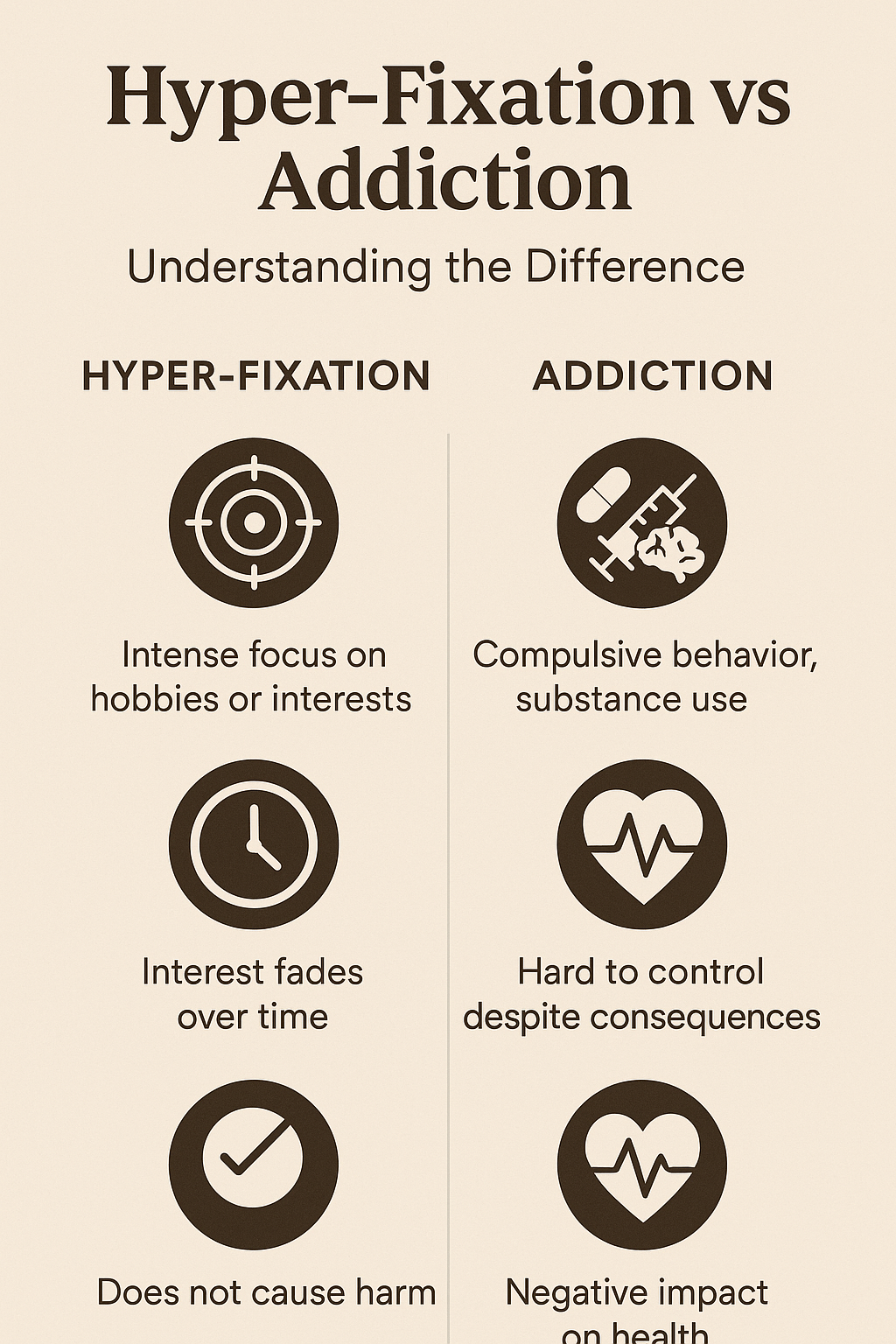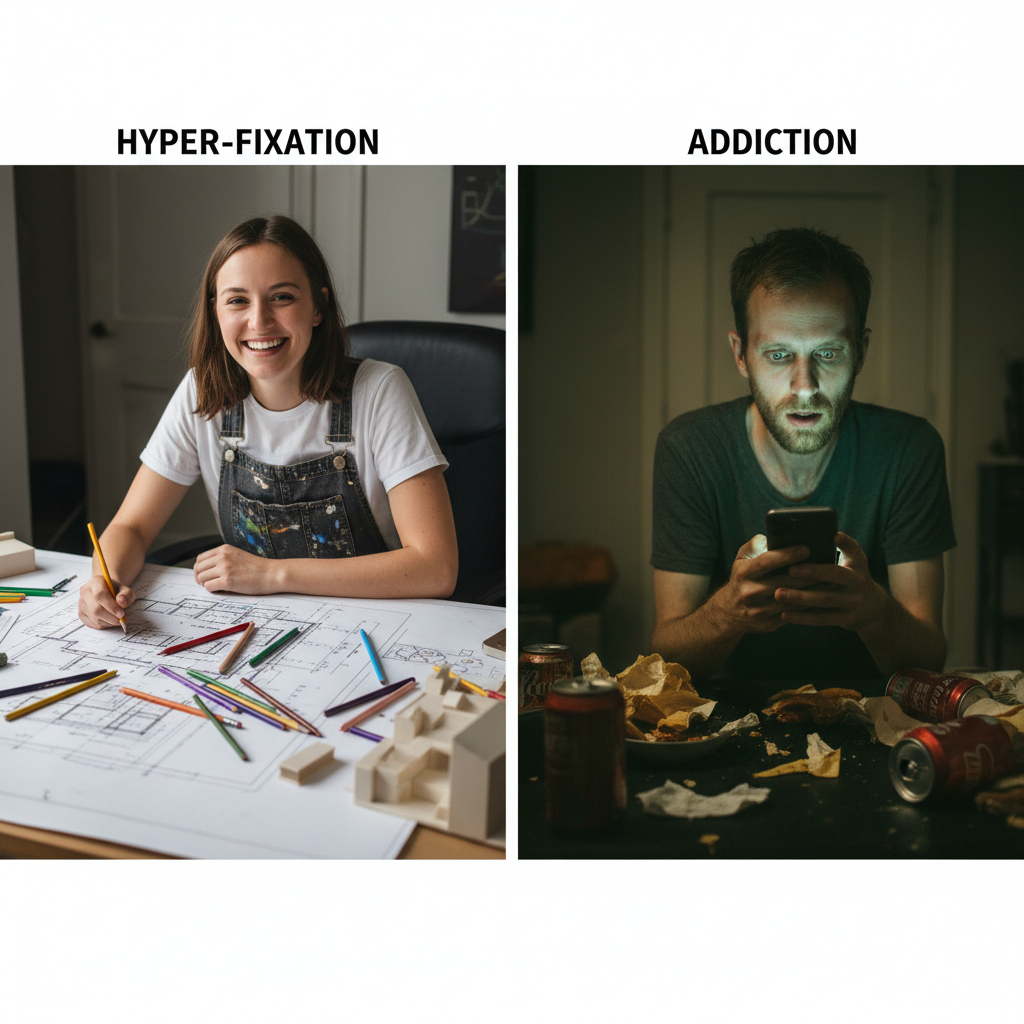If you’ve ever been so absorbed in a hobby, project, or TV series that you lose track of time, meals, or even sleep, you’re not alone. That deep focus—often called hyperfocus—can be exciting and even rewarding, especially when it fuels creativity, learning, or productivity. Many people experience it, though it’s often more common among those with neurodivergent traits such as ADHD or autism. However, what starts as enthusiasm can sometimes slide into something less healthy. When a passion begins to dominate your daily routine, disrupt relationships, or become the sole source of comfort or validation, it may be crossing into addictive territory. The key difference lies in balance and control: hyperfixation is intense but temporary, while addiction traps you in a cycle that’s hard to break. In this discussion, we’ll explore where that line is—and how to recognize when a passion starts turning into a problem.
Understanding Hyper-fixation: When Focus Feels Like a Superpower
Hyper-fixation is when something grabs your attention so completely that you lose track of time. People often use this word to describe moments when they’re working on a favorite activity, such as writing, drawing, coding, or researching a personal interest, for hours without distraction. For lots of neurodivergent folks (such as those with ADHD or autism), this is a known experience, though it can happen to anyone during something they genuinely enjoy.
During hyper-fixation, your brain releases feel-good chemicals, such as dopamine, making the experience rewarding and productive. Many people create their best work, tackle massive projects, or learn new skills while hyper fixated. The effect can be pretty handy for reaching goals when used in bursts. But when do those long hours of focus start to cross the line? The answer isn’t always obvious, and it often depends on how much control you have over this focus and its effects on daily life.
Hyper-fixation vs. Addiction: Comparing the Difference
Both hyper-fixation and addiction involve intense focus on an activity, but their causes and impacts on daily life are not the same. While hyper-fixation usually centers on genuine interest and fades with time, addiction often involves compulsive behavior that persists even when it hurts other areas of your life.
- Hyper-fixation: Usually linked to excitement or curiosity. The interest is intense but temporary, and people can often pause or switch focus when needed.
- Addiction: Driven by cravings and an urge to repeat the behavior, even when it leads to negative consequences, like trouble at work or in relationships. It often requires intervention or support to manage.
For example, binge-watching a new series for a week and then losing interest is a classic sign of hyper-fixation. Needing to play video games or gamble every day to the point where it disrupts work, friendships, or health can point toward addiction.
Recognizing When Passion Becomes a Problem
Finding the boundary between healthy hyper-fixation and problematic behavior can be tricky. Here are some things I look out for personally and suggest to others when thinking about whether an activity is crossing a line:
- Impact on Daily Life: If your interest in something leads you to skip meals, neglect hygiene, or ignore real-world responsibilities for long periods, it could be a problem.
- Loss of Control: If it feels impossible to stop the activity once you’ve started, even if you want to, that’s a red flag.
- Withdrawal: Feeling anxious, irritable, or empty when you can’t jump into your favorite activity is another warning sign.
- Hiding or Lying: Concealing the amount of time or energy you’re spending on something, especially to avoid criticism, may indicate that your passion is taking over in unhealthy ways.
Temporary burnout or neglect is relatively common among individuals with intense interests. However, if the issue persists or causes you distress, it may be time to assess its impact on your life. The National Institute on Drug Abuse defines addiction as a chronic condition, so the pattern and duration matter, not just the short-lived spikes.
Common Triggers: Why Hyper-fixation Happens
Understanding what triggers a period of hyper-fixation can help you manage it. In my experience, triggers often include:
- Stress or Boredom: Escaping into an interest to avoid challenging emotions or situations.
- Personal Strengths: Some people naturally get into periods of deep focus when they’re deeply curious or engaged by a topic.
- Community and Belonging: Interacting with others who share your passion can fuel more interest and lead to longer fixations.
- Underlying Mental Health: For some, hyper-fixation is tied to conditions like ADHD, anxiety, or depression. Feeling the urge to dive into interests can be an emotional coping tool.
When healthy, hyper fixation acts like a boost of motivation. But relying on it to avoid real-life challenges or feeling like you can’t function without your “fix” could be a problem. It’s essential to recognize when these interests provide a boost and when they start to dominate your day-to-day life.
Managing Healthy Focus Without Losing Balance
Channeling periods of intense focus is a real superpower when you can also step back and take care of yourself. Here are some strategies that I find really useful for keeping things balanced:
- Set Timers or Reminders: Use alarms to break long periods of focus, prompting you to eat, move around, or check in with others regularly.
- Plan Downtime: Schedule time for other activities, such as exercise, chores, and socializing, to avoid burnout or isolation.
- Track Patterns: Journaling or using an app can help you notice when fixation becomes disruptive and catch it early.
- Connect with Others: Talking with friends, family, or a mental health professional can help keep your perspective fresh and spot potential trouble signs. Sharing your feelings can help you make out when you need to shift focus.
When managed thoughtfully, hyper-fixation can be a helpful tool, rather than something to feel ashamed about. Balance is the goal, not perfection. Even highly motivated people benefit from varying their routines to ensure their passion remains healthy.
Risks of Ignoring the Signs
When intense interests or behaviors take over without boundaries, the risks begin to accumulate. From my own experience and talking with others, ignoring these signs can lead to:
- Nutritional and Physical Health: Skipping meals, losing sleep, or neglecting exercise leads to burnout and physical health problems.
- Relationship Strain: Isolating from friends or family who don’t share your interests can create distance or conflict over time.
- Work or Academic Issues: If a fixation interferes with deadlines or commitments, you might face real-life setbacks.
- Increased Anxiety or Depression: As the cycle of fixation and disappointment repeats, mental well-being can take a hit.
Early action can prevent bigger consequences. Simply recognizing when things are tilting out of balance makes it easier to get back on track. If you spot these warning signs, don’t hesitate to reach out for support, whether from friends, family, or professionals.
Tips for Parents and Supporters: Helping Someone in the Grey Zone
If you notice a friend or loved one exhibiting signs of obsession with an activity, it’s not about criticizing or shaming them. Here’s what’s worked for the people I know and me:
- Listen First: Ask questions and listen to how they feel about their interest. Nonjudgmental support goes a long way.
- Encourage Breaks: Gently suggest time-outs or new activities to help break up long stretches of focus. Offer to join them in another activity to make the change feel more natural.
- Model Balance: Share your own ways of mixing passions with daily life. Sometimes, seeing balance in action is more helpful than any advice.
- Know When to Get Help: If someone’s fixation is causing real-world harm, it’s worth reaching out to a counselor or therapist for support.
Support, not confrontation, is key to helping those you care about keep their passions in a healthy zone. Remember that gentle encouragement is usually more effective than direct criticism, and showing patience can help build trust.
FAQ: Hyper-fixation, Obsession, and Addiction
Question: Can hyper-fixation ever turn into addiction?
Answer: Sometimes, especially when the behavior becomes about avoiding negative emotions or creates real-life problems. Most hyper-fixations fade, but if you notice them persisting and taking over, it’s worth consulting a mental health professional.
Question: How can I tell if my interest is a passion or a problem?
Answer: If you’re able to step away, keep up with daily life, and still feel good about your interest, it’s usually on the healthy side. Struggling to stop, feeling distressed, or hiding your behavior are signs that it may be helpful to seek outside support. Check in with yourself regularly to identify changes in your thought patterns regarding your habits.
Question: Do only people with ADHD or autism experience hyper fixation?
Answer: No, anyone can experience periods of hyperfocus, but it’s more common and noticeable in neurodivergent individuals due to differences in how their brains process interest and motivation. If you notice patterns of intense focus, it doesn’t automatically mean you fit a diagnosis.
Resources and Further Reading
If you’re looking to learn more, these links are worth checking out:
- NIMH: Mental Health Information
- ADDitude Magazine: Hyperfocus and ADHD
- Psychology Today: Understanding Addiction
Being passionate about something can brighten life and open up new worlds. Just keep an eye out for the tipping point and take care of the rest of you as well. That’s how you make passion work for you, instead of the other way around. If you’re ever unsure, it’s always okay to ask for advice or support because maintaining your well-being is what truly counts.
Video: Hyper Fixation vs Addiction: Understanding the Difference

